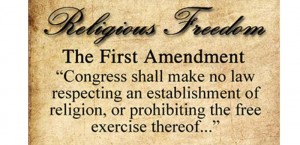 There’s an interesting legal story making the news these days and it hits home for this Atheist. Supreme Court Justice Scalia recently spoke at a gathering at Colorado Christian University and put forward the idea that the federal government and the states are not obligated to protect people who do not have a religion. That it is “absurd” to suggest Atheist are protected by the First Amendment.
There’s an interesting legal story making the news these days and it hits home for this Atheist. Supreme Court Justice Scalia recently spoke at a gathering at Colorado Christian University and put forward the idea that the federal government and the states are not obligated to protect people who do not have a religion. That it is “absurd” to suggest Atheist are protected by the First Amendment.
The gist of his argument centers around the interpretation of what is called the Free Exercise Clause of the First Amendment to the Constitution of the United States. It reads: Congress shall make no law respecting an establishment of religion, or prohibiting the free exercise thereof…
Justice Scalia seems to be saying that while it would be completely illegal to bar a Muslim from entering an establishment it would not be likewise Constitutionally illegal to bar an Atheist. Being a Muslim is a religion as is being a Christian, Buddhist, Jew, Wicca, or any other religion. The Constitution would certainly protect anyone of those religious faiths from being denied access to anything because of their beliefs.
There is something called the No Religious Test Clause in the Constitution. It reads thus: The Senators and Representatives before mentioned, and the Members of the several State Legislatures, and all executive and judicial Officers, both of the United States and of the several States, shall be bound by Oath or Affirmation, to support this Constitution; but no religious test shall ever be required as a qualification to any office or public trust under the United States.
It seems reasonable that Justice Scalia would allow a Non-Religious Test to be administered to anyone who sought public office. That if you said you were an Atheist you could be legally barred from holding office in the United States.
I cannot tell you exactly what Justice Scalia thinks but it certainly must fall along the lines of the idea that when the Founding Fathers wrote the Constitution they meant to protect people of any religion but not people of no religion. The strict interpretation is that barring someone from practicing their religion of choice does not apply to not practicing a religion at all.
If this is the case then it would be perfectly legal, although perhaps not reasonable, to pass a law that discriminates against Atheists. That an Atheist could be charged with a crime for not believing in any religion. That an Atheist could be imprisoned for not having a religion. This would require the legislatures of a community passing such a law but it would not be unconstitutional.
Naturally, being an Atheist, I find this interpretation disturbing.
It’s an argument that holds up when we think about physical items. We can have a dog park where all dogs are welcome but no non-dog can enter.
The problem is that the exercise of our religion is not a physical thing. It’s an idea. It’s like saying no one is allowed to prevent you from thinking but they can prevent you from not thinking. Not thinking is a separate thing from thinking.
Let’s say there is a beautiful buffet and the rule is that everyone is allowed to smell the food in any way they desire. Using a cone, from far away, from up close, but it’s completely illegal to not smell the food. Not smelling the food is exercising your right to smell in any way you desire, not to do it. You can eat the food any way you want. Off a plate, by hand, using a fork, using a spoon, having your spouse feed it to you, but not eating it is illegal. We have the freedom of speech and this, of course, means we can choose not to speak. We have the right to bear arms, and of course, we have the right to not do so. Trying to separate the two things is an exercise in intellectual dishonesty.
Justice Scalia seems to be saying it would be perfectly Constitutional to pass a law saying everyone must, at all times, make political speech. That not making politically free speech is a crime.
I absolutely disagree. The freedom to not exercise our rights is an inherent and crucial part of exercising our rights.
Freedom of religion must include freedom to not be religious. They are tied together as one.
Tom Liberman
Sword and Sorcery Fantasy with a Libertarian Edge
Purchase The Broken Throne today!
See All my Books
He seems willfully ignorant of the beliefs of the founding fathers. Of course, rationality rarely influences Scalia. He is a justice, his word is the interpretation of law regardless of all else.
Of course he unveils the truth of the historic supreme court process. Modern people willfully think the court was ever as pure as the court of their imagination.